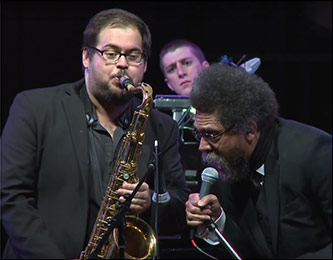American Music Review
Vol. XLVI, Issue 2, Spring 2017
As I write this, in the wake of tragic events in London, President Trump has renewed is efforts to impose a “travel ban” on immigrants from several predominantly Muslim countries. Nativist rhetoric has reached fever pitch in the US and abroad, and when I look out at my Brooklyn College classes of students from all over the globe, many the children of first-generation immigrants, I feel both pride in their courage and foreboding about their future. Our current administration has played to the worst of America’s fears through its daily assaults on our nation’s commitment to diversity and social justice; but it has also brought out the best in us, as millions have pushed back with fervent calls for inclusivity and a celebration of the diverse cultural traditions that they believe are our greatest strength. This special issue of American Music Review was inspired by two concerns currently at the forefront of much social and political debate: how this country treats immigrants and immigrant communities, and where we stand on the global stage. Any student of American musical history is aware of the cultural richness brought to these shores by legions of artists and musicians from around the globe. In this issue we offer a modest look at the ways such immigrant communities continue to enrich the musical life of the US, as well as how music can help frustrate the xenophobic wall-building of those in power.
Social justice in the Trump era became a central issue during a recent visit by author, philosopher, and activist Dr. Cornel West. On 17 May 2017 the Hitchcock Institute sponsored a series of events to celebrate this remarkable and controversial voice. A special podcast featured several groups of students in dialogue with Dr. West about topics ranging from immigration to Black Lives Matter. As Brooklyn College enjoyed a gorgeous spring day, Dr. West had opportunities throughout the afternoon to engage with students who instantly recognized him as he crossed campus, sharing insights with a typical mixture of warmth and humor. In the evening, I facilitated a talk with Dr. West and Arturo O’Farrill for an enthusiastic audience of students and members of the community. O’Farrill then lead a concert by the Brooklyn College Big Band that concluded with the Brooklyn premiere of his Cornel West Concerto, featuring West’s oration (riffing on statements by W.E.B. Du Bois) and improvised interactions with band members, all backed by a stirring score. The concert also featured O’Farrill’s A Still, Small Voice, which highlighted the Brooklyn College Conservatory Singers under the direction of Malcolm J. Merriweather. The entire event was filmed by the Brooklyn College Department of TV and Radio, and will be available soon at www.hisam.org.
Dr. West’s visit capped a term of wide-ranging events. On 21 March, Angela Piva, a member of the audio and music production staff and faculty at the Brooklyn College’s new Feirstein Graduate School of Cinema, gave insights from a long career as a studio engineer and producer for artists such as Mary J. Blige and Michael Jackson; on 30 April Lucie Vágnerová presented on the experimental vocalist Pamela Z and her work with a biofeedback system called the BodySynth; and on 2 May, Noriko Manabe spoke on “The Sounds of Post-Inauguration Protests: Memory, Circulation, Innovation,” delving into the music and chants heard at recent rallies and marches.
Finally, congratulations to Senior Research Associate Ray Allen, who has been named a Distinguished CUNY Research Fellow with the Advanced Research Collaboration (ARC) at the Graduate Center of the City University of New York. He will spend the Fall 2017 semester completing his book project Jump Up! Caribbean Carnival Music in New York that is scheduled for publication by Oxford University Press.







